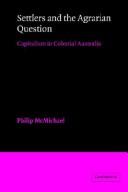| Listing 1 - 1 of 1 |
Sort by
|

ISBN: 0521265703 0521523168 0511529139 9780521265706 9780511529139 9780521523165 Year: 1984 Publisher: Cambridge [Cambridgeshire]: Cambridge university press,
Abstract | Keywords | Export | Availability | Bookmark
 Loading...
Loading...Choose an application
- Reference Manager
- EndNote
- RefWorks (Direct export to RefWorks)
This book traces the formation of Australian colonial society and economy within the context of the changing fortunes of British hegemony in the nineteenth-century world economy. Australia's transition from conservative origins as a penal colony supporting a grazier class oriented to export production, to liberal agrarian capitalism, was not a simple reflex of imperial setting. Domestically, the 'agrarian question' - who should control the land and to what end? - was the central political struggle of this period, as urban-commercial forces contested the graziers' monopoly, of the landed economy. Embedded in the conflict among settler classes was an international dimension, involving a juxtaposition of laissez-faire and mercantilist phases of British political economy. Professor McMichael argues that the transition from a patriarchal wool-growing colony to a liberal-nationalist form of capitalist development is best understood through a systematic analysis of the effect of the imperial politicoeconomic relationship on the social and political forces within nineteenth-century Australia.
Land tenure --- Land settlement --- Squatter settlements --- History --- Arts and Humanities --- Land tenure - Australia - History - 19th century. --- Land settlement - Australia - History - 19th century. --- Squatter settlements - Australia - History - 19th century. --- Informal settlements (Squatter settlements) --- Irregular settlements --- Settlements, Spontaneous --- Settlements, Squatter --- Shack towns --- Shanty towns --- Shantytowns --- Spontaneous settlements --- Uncontrolled settlements --- Cities and towns --- Slums --- Resettlement --- Settlement of land --- Colonies --- Land use, Rural --- Human settlements --- Agrarian tenure --- Feudal tenure --- Freehold --- Land ownership --- Land question --- Landownership --- Tenure of land --- Real property --- Land, Nationalization of --- Landowners --- Serfdom
| Listing 1 - 1 of 1 |
Sort by
|

 Search
Search Feedback
Feedback About UniCat
About UniCat  Help
Help News
News